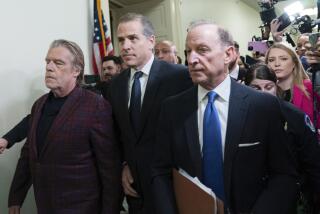Hunter Defense Reveals Appeal Strategy in Court Papers Urging Client’s Release
- Share via
Nancy Hoover Hunter, convicted earlier this week of federal tax evasion, has 14 “solid” grounds for appeal, including the fact that her widely publicized trial was not moved out of San Diego, her lawyers argued in legal papers filed Thursday.
Urging a federal appeals court to release Hunter from jail pending formal sentencing, the lawyers argued that the “strength” of her appeal was just one of the reasons Hunter is no more of a risk to flee than she was before conviction Monday.
The lawyers also claimed that it was “unfounded” to suggest that Hunter would flee, because she had been under indictment for more than three years but had not sought to leave the country permanently and sending her to jail during the holiday season is “cruel and smacks of punishment.”
“If Ms. Hunter were a flight risk, she would have departed . . . long before now,” attorneys Robert Brewer and Richard Marmaro said in the brief, filed with the U.S. 9th Circuit Court of Appeals in San Francisco.
The brief, in which the lawyers asked that Hunter be able to await her Feb. 20 sentencing at home, essentially recounted the factors that failed to convince U.S. District Judge Earl B. Gilliam that Hunter was not a flight risk. Gilliam sent Hunter to jail without bail immediately after her conviction on four of 197 counts.
However, the papers identified, apparently for the first time, the issues Hunter’s defense team plans to attack when they file an appeal.
Besides trial publicity, most of the 13 other grounds centered on errors that Gilliam, who presided over Hunter’s eight-month trial, purportedly made, the attorneys said in the papers.
The case against Hunter stemmed from her role as a top executive in the La Jolla investment firm J. David & Co. from 1979 to 1984, when its checks began to bounce and nervous investors forced the firm to file for protection under the U.S. Bankruptcy Code.
In all, investors lost about $80 million in the J. David affair, a giant Ponzi scheme in which prosecutors alleged that Hunter played an active role. The defense lawyers said Hunter was blinded by her love for the firm’s founder, J. David (Jerry) Dominelli, and was unaware of any illegal activities.
The jury that convicted Hunter of the tax evasion counts also acquitted her of one other tax-related charge but deadlocked on the 192 counts that centered on her alleged involvement with the Ponzi scheme, a pyramid in which money from new investors is used to pay off earlier investors.
The trial, which began March 28, is believed to be the longest-running criminal case in the history of the San Diego federal court. Hunter faces up to 20 years in prison, or five years on each of the counts.
Gilliam, Hunter’s defense team said, could have moved the case out of San Diego to ensure a fair trial. And he could have sequestered the jury, should have dismissed a juror whom they said had outside contact during the trial, and should not have re-read jury instructions halfway through the panel’s deliberations, the defense contended.
In addition, the lawyers maintained, Gilliam was too harsh in not allowing them to ask witnesses about certain issues, including Hunter’s relationship with Dominelli.
The lawyers detailed several other technical mistakes they said Gilliam made and contended they brought up the “strength” of Hunter’s appeal only because an appeals court may consider that in deciding whether someone is a flight risk.
The attorneys also said that Hunter’s conviction did not by itself make her so untrustworthy as to be kept locked up until her Feb. 20 sentencing. And the conviction was one of only two factors Gilliam discussed when ordering her to jail, they said.
The other reason was Gilliam’s statement that Hunter lied when she testified in October that she was innocent of related state charges, though she had entered a guilty plea in 1986.
When Hunter said she agreed to the plea bargain because she didn’t know if she had the energy to go through two trials, that wasn’t lying, the lawyers said.
Calling plea bargains a “fact of life in the judicial system,” the attorneys said it was “difficult to understand” why Gilliam “refuses to accept the notion” that people sometimes plead guilty “to offenses they did not commit in order to end a case on relatively favorable terms.”
The 1986 deal--in which Hunter admitted that she funneled money, allegedly J. David funds, to Roger Hedgecock’s successful 1983 campaign for San Diego mayor--brought Hunter fines and probation, but no jail time.
More to Read
Inside the business of entertainment
The Wide Shot brings you news, analysis and insights on everything from streaming wars to production — and what it all means for the future.
You may occasionally receive promotional content from the Los Angeles Times.










